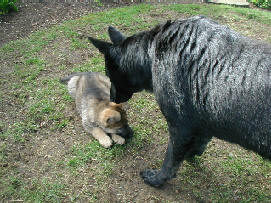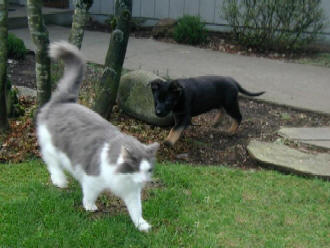|
Bringing Home the
new Puppy

It's time for
you to bring home that new puppy,
and for a true dog lover, this is
one of the most rewarding times of
their life.
Dogs bring joy to us as owners in a
variety of ways, be it
companionship, protection, or the
joy we feel when they succeed in
their training and become the pride
and joy of their owner, who has
invested such time and effort into
their training.
A pup can be
lots of work, so be prepared to
"puppy proof your home and yard"
BEFORE your pup arrives. Designate a
comfortable place for the puppy to
live while you are away. A
crate, a puppy pen, a secure kennel
set up inside your garage, or other
secure area
that he can be safe, comfortable and warm.
Taking time ahead of his arrival to
set things up properly will insure
that he
can't get hurt,
get into
trouble, or get away and be lost.
Give him his favorite toy or a raw
knuckle bone, to keep him occupied
while you're away.
Be watchful that you don't leave the
pup with a toy that can be torn
apart and ingested...
and be watchful
that he isn't one to tear up
blankets and eat the stuffing.
This can be dangerous, so keep an
eye out that he isn't being
destructive /eating the items
that
are left with him throughout the
day.
If you have older dogs in the home,
take the time to insure that their
first meeting is a good one. You can
set up visits with the new pup and
your adult dog(s) several days
ahead, if that's an option for you.
If not, when the pup arrives it is
helpful to have that first meeting
between the resident dogs and the
new pup scheduled to take place at a
meeting area OFF
the home premises, such as a
friend's house, a nearby park or
other neutral location. ..Doing this
will help to prevent the showing of
jealousy from the adult dogs toward
the new pup, eliminating the feeling
from the adult resident dogs that
the pup is an intruder into "their"
home.. Let them play together, get
to know each other and have fun
together before taking them all back
to your home. Their friendship
has then initially been established
on a good note, and should become
stronger as they get to know one
another. This will make those
first interactions much less
stressful...for the pup, and for you
as the owner.
Like horses, dogs have the ability to assess that this is a youngster,
and
normally do not have the desire to
harm them.
That being said, supervision of their
interactions is important for those
first few days
to insure everything
is going as it should.
If you're
bringing in an older pup, Don't
expect him to obey or understand
your routines immediately. . Allow
him a place to eat without the fear
of others coming in on him, and a
place where he can enjoy his toys
safely. You can avoid many squabbles
over food /toys if you don't put him
in the position of feeling the need
to defend himself upon his arrival.
Consistency and
Leadership are important
When
bringing home that new pup,it will
be important to establish that you
are the pack leader, but at the same
time, try not
to be too overbearing. Know at
all times where the pup is at and
what he is doing, but let the pup explore as
much as he feels the need to.
Establish for the pup a small area that will
contain him, and yet will
still give him the freedom
to explore without getting into
trouble.
Don't let him run
about on his own, for he will surely
find many things that he can get
into trouble with.
Be
consistent with your normal daily
activities, as much as possible.
Give equal time to the "old" dogs
who have been there before the pup,
and don't neglect them and their
favorite times with you such as
going for a car ride, taking them
for walks by himself when the pup is
sleeping,
and continue giving your older
canine companions their familiar "one on one
special time" with you.
The
Elder dogs of the pack at times will
get out of sorts with the youngster
if he oversteps his bounds with
them.
Preventing adult dogs from properly
correcting inappropriate actions of
a juvenile can lead to problems of
dominance or aggression from the pup
later. When adolescence hits,
an insubordinate youngster at some
time will decide he can challenge
the reigning adult, and serious
fights for the dominant position can
result.. It's a good idea to
let those older, wiser adults set
those youngsters straight at an
early age. This will quickly
have the pup respecting their adult
pack members.
Older dogs
should never be allowed to harass,
dominate or terrorize a pup! When you see several
dogs together which are showing an
undue "interest" in the pup, put a
stop to this immediately as this is
a very quick way to have things
spiral out of control and the pack
mentality will kick in. The
pup will not see this as a friendly
situation, NOR will it be one.
The pup should not be allowed to
harass the adult dogs either, as
they will quickly become tire of
this.
Use your leadership to set the
rules, and then to enforce the
rules, and chances are good that
your pack will be a harmonious one.

Your puppy and
your cat...
That first meeting is all important.
Cats and
other small pets should be
introduced to the puppy under close
supervision. It is important
not to let a chase ensue, or you
will quickly loose control of the
situation. Aggression on the
part of the puppy should be
immediately but gently corrected,
and he should be made aware that the
cat or other pet was here first and
is to be considered a member of his
future pack. They will more
often than not grow to be fast
friends and spend their years
together enjoying the company of one
another.
Schraderhaus K9
|